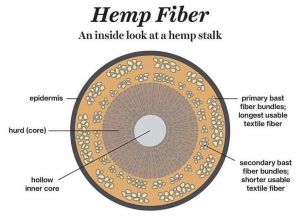Qannabis: Difference between revisions
m (→Seed) |
m (→Stalk) |
||
| Line 60: | Line 60: | ||
*Fuel | *Fuel | ||
ETHANOL * SYNTHGAS | ETHANOL * SYNTHGAS | ||
Thomas says:To make ethanol from hemp, you will need to extract the cellulose from the plant material. Cellulose is the main component of plant cell walls, and it is what gives plants their structure. To extract the cellulose, you can use a process called hydrolysis. Hydrolysis is a chemical reaction that breaks down the cellulose into smaller molecules. | |||
Once the cellulose has been extracted, you will need to ferment it. Fermentation is a process that breaks down the cellulose into sugars. These sugars can then be used to make ethanol. | |||
To make ethanol from hemp, you will need to follow these steps: | |||
1. Extract the cellulose from the plant material. | |||
2. Ferment the cellulose. | |||
3. Use the fermented sugar to make ethanol. | |||
==Flower== | ==Flower== | ||
Revision as of 13:09, 12 October 2022
Definition
Historical
- endocannabinoids* as only coevolutionary "capillary" system (vs. cardiac + cranial)
Technical
- endocannabinoids* as pain relief, psychedelic, etc. etc.
Propagation
Soil
Seed
Stalk
Flower
Application
Soil
- Remediation
- Aeration
Seed
- Foodstuffs
"feed" vs "food"
- Oils
FOODMEDS(edible,topical) * PLASTIC * BIODIESEL
To make biodiesel from hemp, you will need to extract the oil from the plant material. Hemp seeds contain a high percentage of oil, and this oil can be used to make biodiesel.
To make biodiesel from hemp, you will need to follow these steps:
1. Extract the oil from the plant material.
2. Process the oil to remove impurities.
3. Use the processed oil to make biodiesel.
Stalk
graphic: skin(bast(hurd/shiv(0)) define: decortication
The hemp bast is the soft, inner layer of the hemp plant's bark. It is used to make rope, twine, and fabric. The hurd is the woody core of the hemp plant. It is used to make paper, animal bedding, and composite wood products.
As a general rule, the bast is used for softer applications while the hurd is used for tougher applications.
Decortication is the process of removing the hemp plant's outermost layer, the bark. This can be done mechanically, with a machine that strips the bark off in one pass, or manually, by stripping it off by hand.
Decortication can also be used to process other plant materials, such as flax, jute, and kenaf.
Decortication separates the hurd from the bast by breaking up the stem of the plant. This can be done with a machine that uses spikes or knives, or by hand.
The bast fibers are then separated from the hurd by a process called retting. This can be done chemically, with a solution of water and enzymes, or mechanically, with a machine that strips the bast fibers off of the hurd.
- Fiber
bast: PLASTIC * CLOTHES * ROPE * INSULATION hurd: CONCRETE * WOOD * PAPER * BEDDING
For animals, the hurd is often used as bedding because it is absorbent and doesn't harbor bacteria like straw or hay. As a feed, the hurd is high in fiber but low in nutrients. It is sometimes used as a filler in animal feed mixes.
- Char
CHARGERS * Biochar
- Fuel
ETHANOL * SYNTHGAS
Thomas says:To make ethanol from hemp, you will need to extract the cellulose from the plant material. Cellulose is the main component of plant cell walls, and it is what gives plants their structure. To extract the cellulose, you can use a process called hydrolysis. Hydrolysis is a chemical reaction that breaks down the cellulose into smaller molecules.
Once the cellulose has been extracted, you will need to ferment it. Fermentation is a process that breaks down the cellulose into sugars. These sugars can then be used to make ethanol.
To make ethanol from hemp, you will need to follow these steps:
1. Extract the cellulose from the plant material.
2. Ferment the cellulose.
3. Use the fermented sugar to make ethanol.
